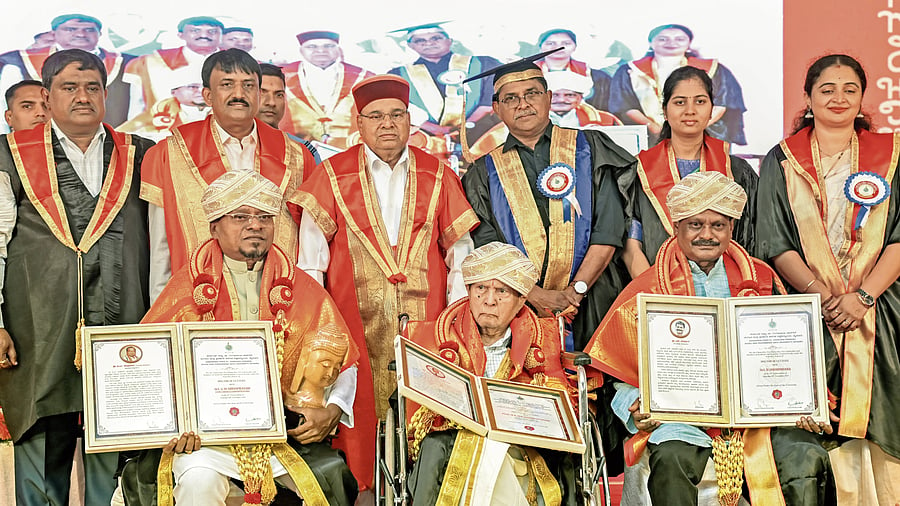
Governor Thaawarchand Gehlot, Vice Chancellor of Kalamandalam University, Kerala,B Ananthakrishnan and KSGHMPA University VC Nagesh V Bettakote, during the 10th Annual Convocation of Karnataka State Gangubhai Hanagal Music and Performing Arts University in Mysuru on Saturday. Honorary Doctor of Letters presented to Prof B R Sheshadri (Music and Sanksrit), H Janardhana (Theatre artist) and G M Shivaprasad.
Credit: DH Photo
Indian traditions, traditional performing arts, culture, cultural expressions, and their values are not in a peril in the 21th century, contrary to the fear of artists and cultural activists, about their future and sustenance. The art forms are surviving with transformation, in accordance with social, scientific, technological and geographical changes in the world, said Vice Chancellor of Kalamandalam University, Kerala, B Ananthakrishnan.
During the 10th annual convocation of Karnataka State Gangubhai Hanagal Music and Performing Arts (KSGHMPA) University in Mysuru on Saturday, Ananthakrishnan said, “The changes in the fields of science, technology, and governance systems over the years changed our lives beyond our imagination. Same kind of changes happened in arts and culture. The forms we see now are shaped and reshaped by earlier generations, and handed over to us to shape it for the future generations. Survival of tradition and traditional arts are only because of this change and their ability to accept change.”
‘Culture is a national treasure’
He said, “A nation is framed by its culture and known for its culture. Thus, culture is a national treasure. Even after having a great wealth of cultural performance, the pertinent question is why is performing arts not seen as a serious subject in India. Why is it not seen on par with other epistemic fields like science, social science or humanities by constituting agencies like education and policy-based instruments?”
He added, “Having closer to a hundred years of institutional history for performance training in India, we could not make our subject as an epistemic field which create scientific knowledge. It may be because of the heterogenous nature of the practices spread across diverse languages, dialects, regions, and geographies with multiple genre-based classifications. There are conflicts in terms of definitions between the native categories of expression and the analytical categories accepted by the scientific communities globally. Many native categories in different contexts are not having equivalent terms to denote them in another language.”
Ananthakrishnan said, “At a time when traditional patronage systems faded away, a public institution like Kalamandalam was formed. Universities like KSGHMPA and Kalamandalam play a vital role in sustenance of arts and artists welfare.”
KSGHMPA University Vice Chancellor Nagesh V Bettakote was present at the annual convocation.
